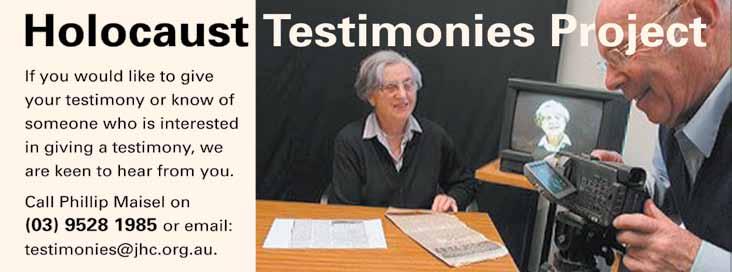
2 minute read
The career of my English language
Helen Leperere
The year was 1939. My first year, and only year, in high school. Until then German had been compulsory, but my Polish school introduced English as another choice of foreign language.
Advertisement
My older sister, Bronia, was about to begin her final year of matriculation when the war broke out. For all those years she had been studying German. She was a very good scholar, but somehow her teacher was not happy and complained to our parents that she used Yiddish expressions instead of German. My parents were surprised. When our grandfather used to visit us and we were supposed to speak Yiddish, Bronia spoke German to him. My poor Bronia!
So, my parents decided that I should try English. My English teacher was very pleased with me and told my parents that I had a good accent and was making progress. My parents were proud.
Well, the good Lord invented wars and sure enough war broke out. Curfews were imposed and listening to radios was forbidden. After the first few weeks, word spread that the Queen Mother, then the Queen of England, was to make a speech on the radio.
My father started quietly to invite all the neighbors in the building to come to our place. ‘My daughter will translate; she is very good at English,’ he said. One by one they came in quietly. Blinds down, lights dimmed, everybody around the radio. Of course I was given the place of honor and all eyes were on me.
Why, oh why didn’t the floor swallow me then, for I could not understand a word? Not one word! Could it be that the Queen made a mistake and spoke in Chinese instead of English? It must have been so!
Our radio – my father’s pride – was like a cabinet with a magic eye on the side. Suddenly the eye started to flicker and Father commenced to fiddle with the knobs. Mother got angry with him: ‘You are distracting the child. How can she understand anything if you fiddle around?’ But this ‘child’ with perfect marks in school did not understand a thing when it came to the ‘real McCoy’.
Finally, at last, glory! Oh, what glory! I caught one word, two words, three words: ‘Women have courage!’ Breathlessly I translated as fast as I could. My poor father looked sadly at me through his glasses and asked: ‘Didn’t she say that the war will be over soon? Very soon?’ ‘Yes, yes,’ I answered. ‘She mentioned this at the beginning of her speech.’
‘Let us have a glass of chai,’ Mother said with a sigh. For all you English-speaking people chai means tea. And it was only drunk in glasses in civilised Poland.
Not long ago, here in Melbourne, I took a taxi and politely said to the driver: ‘It is a nice day.’ He grinned at me and said: ‘Yeah’, he said. ‘Where are you from lady?’ What a chutzpah! Should I have told him about my ‘perfect accent’ then, in the year of 1939?





